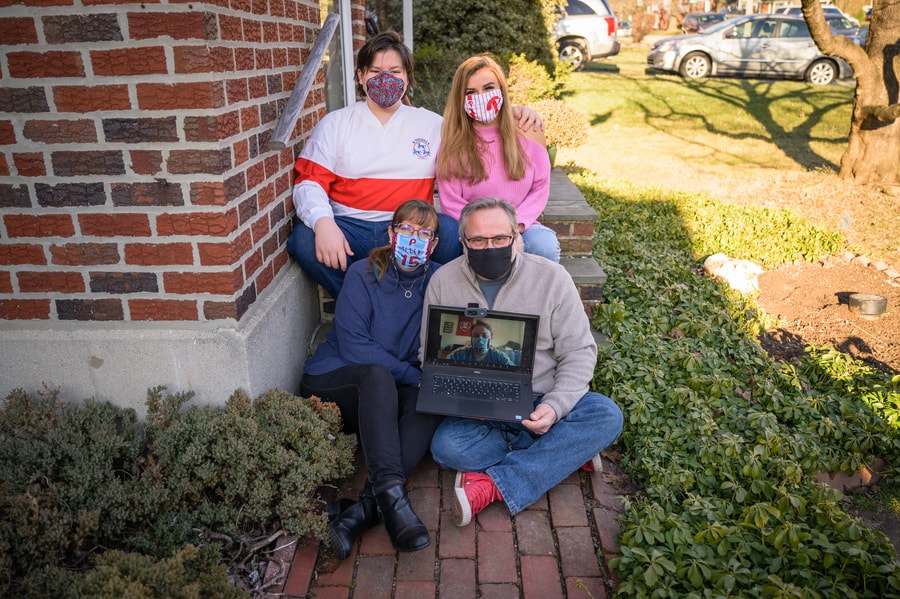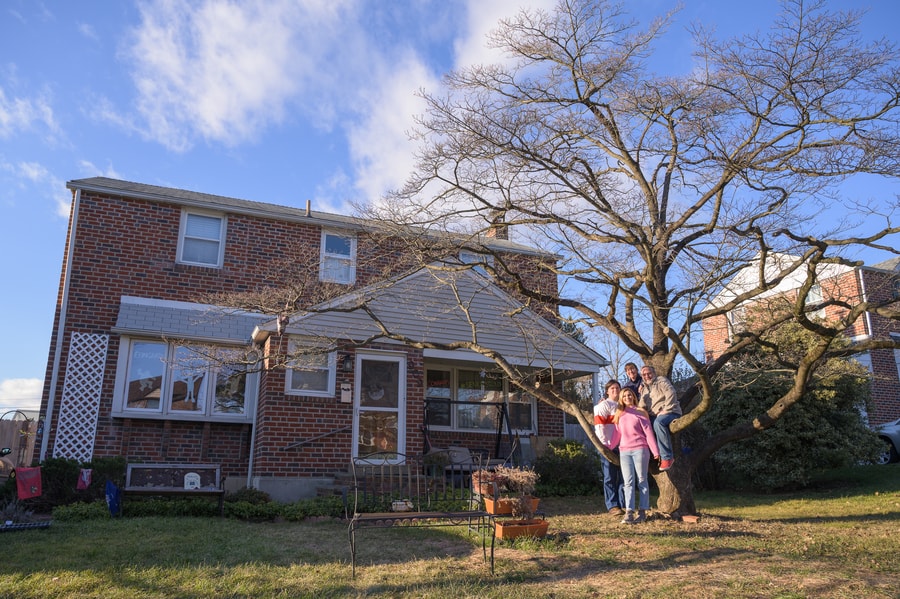Throughout her career, Nell Bang-Jensen (she/her), artistic director of Theatre Horizon, has worked to find ways to connect art and community. In the midst of a pandemic that has many families stuck at home, unable to attend, let alone create, art themselves, Theatre Horizon has created a program called Art Houses, which pairs theatre artists with local households to allow families or individuals to devise and create new pieces of virtual theatre. After two successful installations of the program in December and January, Theatre Horizon prepares for its third presentation on Feb. 27 at 7:30 p.m., which will feature its first Norristown residents—an important step as Bang-Jensen continues her efforts to connect her Philadelphia-area theatre with its larger community.
“I’m always looking to give people more opportunities to participate in the art,” said Bang-Jensen. “One of the things I’m working on as an artistic director is figuring out how to make our relationships with people in our community relational and not transactional. Giving people opportunities for participatory art making is a way to make our space one for everybody.”
For Theatre Horizon, that meant branching out from its usual theatre audience to try to bring in participants who were new to the theatre. Many of the families selected to participate, with whom four more Art Houses are scheduled between now and the end of June, are a few degrees of separation from the theatre, with perhaps family or friends who are patrons. What Theatre Horizon has found so far, Bang-Jensen explained, was that over a quarter of the audiences for each show have been completely new to their organization, and even to theatre at all. Bang-Jensen pointed to the Art House done by Gary Cohen, a driver for Philadelphia’s regional transit system SEPTA, for the January installment of the program.
“He was so proud of the show,” Bang-Jensen recalled, “he handed out fliers to his former colleagues who worked for SEPTA. And I just thought, you know, I don’t think any of those transit workers had seen a show at Theatre Horizon before.”

In addition to expanding the theatre’s reach, Art Houses has proven to be an emotional experience for the participants as they’re given space to reflect on their lives and share parts of themselves with their community in an empowering way. One of the first installments of the series featured Becky Bradbeer, a member of Theatre Horizon’s community who is living with cerebral palsy, who was provided a platform to be the narrator of her own story.
For the program’s third installment, directors Bradley Wrenn and Jenna Horton are working with the Napoli family, Rob and Mary Kay Napoli, along with their children Kat, RJ, and Frankie (not to mention the family’s pets). The Napolis are actually a theatre family by trade, with Rob and Mary Kay even having graduate degrees in acting. But Rob’s career has seen him drift away from acting. He is now the managing director/production manager for Arcadia University’s theatre department. Rob (he/him) joked that he was glad that the technical aspects of this show fall on someone else’s shoulders.
Though the project is completely virtual, Theatre Horizon made an effort to provide all of the families with tech kits and technical assistance to help remove any resource barrier and allow for a diverse array of households to participate in the program. This could include working with a family to find an hour of time when they’re out of the house while a technical director stopped by to, say, hardwire the internet so the family doesn’t have to worry about relying on spotty wifi.
The Napolis, despite actually living near Theatre Horizon, had limited past experiences with the theatre and with devising work. When Rob saw the opening for Art Houses, it felt like the perfect opportunity to get the family involved with the company. Outside of being roped into playing J.P. Morgan in a production of Ragtime a few years ago, Rob hadn’t acted in more than two decades. Now he’s had the chance to have a transformative experience with his entire family.
“It’s been great seeing what they’ve developed into,” Rob said. “It’s kind of given me an outside perspective on that, that they’re intelligent adults with opinions and sense of humor separate from my wife and me.”
Working on this production, which Rob emphasized will make use of their entire house, has even opened the door to more family time for the Napolis. With RJ quarantining at Catholic University where he studies, the time after rehearsals have created space for Rob and Mary Kay to have some Zoom family time with RJ, watching WandaVision or Drag Race.

For Wrenn (he/him), Art Houses is a continuation of Bang-Jensen’s commitment to telling the unsung stories of her community. The duo’s working relationship dates back to Pig Iron’s The Caregivers, a 2018 play led by then-Pig Iron associate artistic director Bang-Jensen and created by home health aides, hospice workers, and family caregivers, in a piece exploring the times where love meets obligation.
“Nell did a beautiful job and continues to do a beautiful job of really focusing on building a process that is very forgiving and kind to the people working within it,” said Wrenn, noting that for The Caregivers Bang-Jensen would even invite those being cared for to attend rehearsals with their loved ones who were creating the production. “The one thing that Nell taught me is, if you focus on the process and taking care of people in the process, you don’t have to worry about how good the final thing is going to be. It will happen if you take care of the process.”
For Art Houses, that translates to shaping production and rehearsal schedules around the availability of each individual family as they work with their assigned director(s). As Wrenn explained, over the last month of working with the Napoli family, the process revolved around finding what worked best for the family and finding a way to create art that can show this family exactly how they are and present that to the world. Perfection, Wrenn said, becomes secondary to meeting the artists where they are.
Throughout the devising process, the family would be given prompts, such as parents Mary Kay and Rob being asked to tell the story of the beginning of their relationship through five objects they could find around the house, or having Rob and Frankie put together a PowerPoint presentation on the greenhouse they built together over the summer. For one scene, Kat, the eldest, might be asked to give a tour of their house by drawing it on a piece of paper and describing her favorite room, while Mary Kay could take a camera and simultaneously show what Kat is describing. In another scene, the family explored the relationship between RJ, the middle child of the group, and Frankie, the youngest, as their less-than-great relationship bloomed into a true friendship during the pandemic.

These ideas started, as Wrenn said, borrowing from an adage, as mud pies which they formed into a Frankenstein, which will result in a Prince Charming presented this weekend. Along the way, Wrenn emphasized, he and Horton were readily responsive to any pushback against their notes, wanting to prioritize making a creation that the family truly loves. It’s a process that Wrenn said was “probably one of the most intimate things I’ve done with strangers in the last year. It feels like theatre. It feeds me in the same way.”
As an extension of that sort of intimacy, Art Houses provided the first 80 ticket buyers with mystery boxes. These mailed boxes contain surprise items specifically selected by the family that are sent to audience houses prior to the performance. The goal is to provide something tactile in addition to the virtual experience. As Bang-Jensen pointed out, it’s easy to get sick of simply watching things on a screen after the last year in theatre. But there’s a renewed excitement around actually receiving mail. Many of the mystery items so far, she noted, have been edible, providing a snack for the performance. The Napolis have even included a Spotify playlist which, Rob noted, just keeps getting longer.
Overall, Art Houses is part of a larger effort from Bang-Jensen and Theatre Horizon to allow the theatre’s community to have a chance to participate in the art-making process. In addition to Art Houses, Theatre Horizon is planning a large outdoor, community-centered performance in 2022, and the theatre has turned its physical space into a center of online learning for children during the pandemic.
The latter program, which has allowed 24 children the space to do their Zoom school from the theatre every day, sprang from listening to the needs of those struggling through the pandemic in the theatre’s county. While Norristown, where the theatre is located, is in the wealthiest county in Pennsylvania, Bang-Jensen noted that around 25 percent of residents live below the poverty line, which got her thinking about how many of the Black and brown families who are hardest hit by the pandemic are coping with the same schooling issues she’s heard raised by friends and board members.
“It got me thinking,” Bang-Jensen said, “how do parents do that? Especially parents who don’t have the luxury of working from home. We had a big empty theatre where it wouldn’t have been safe for us to do in-person programming. We run a class for preschoolers with our partners, the Willow School. So we talked to them about using some of their teachers and some of our teaching artists to supervise and teach a group of kids who were doing their Zoom school during the day in our theatre. Then we provide arts education after school for those kids as well.”
Opening the theatre’s doors even wider to the community’s needs has allowed Bang-Jensen and her staff the chance to get to know parents and students who may not have come to the theatre before. Through efforts like these, deeper bonds can be formed between theatre and community beyond the transactional relationship of one side deciding on what art is created while the other pays for it. For Bang-Jensen, this is a way for the theatre to have a real conversation with its community. More, it’s a way for the theatre to listen.
“It helps me, as an artistic director, understand better how I can serve the needs of my community beyond making shows,” she said. And considering the future of Art Houses in particular, “I think there’s a future for this project. It’s really convinced me that some of the best art comes from seeing the efforts of people who don’t often have the chance to make it.”
Jerald Raymond Pierce (he/him) is associate editor at American Theatre. jpierce@tcg.org


